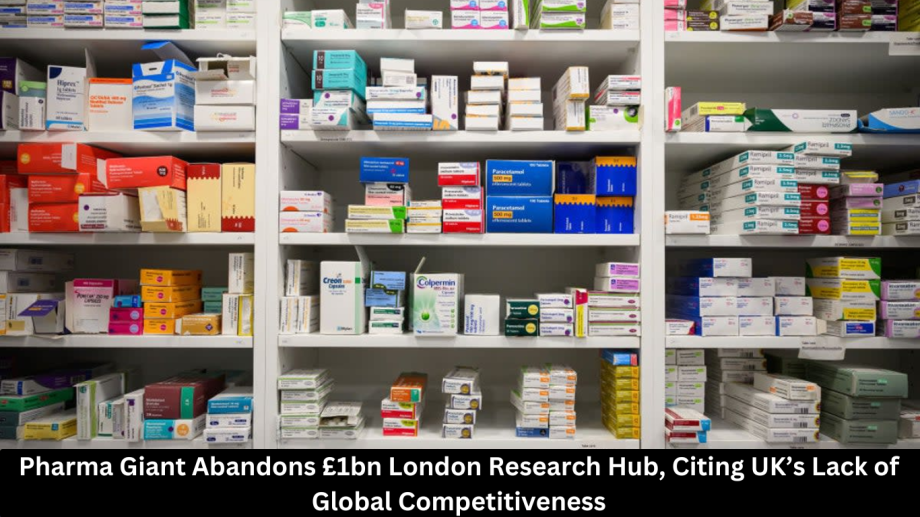In a decision that has sent shockwaves through the UK life sciences and biotech sectors, a major pharmaceutical giant has officially abandoned plans to build a £1 billion research and development (R&D) hub in London.
- Background of the Abandoned Project
- Why the Pharma Giant Pulled Out
- Implications for the UK Life Sciences Sector
- Government and Industry Reaction
- What This Means for UK Research Talent
- Comparisons with Other Global R&D Hubs
- What Needs to Change for the UK to Stay Competitive
- 1. Regulatory Reform
- 2. Tax Incentives and Grants
- 3. Talent Development
- 4. Stronger Public-Private Partnerships
- 5. Rebuilding Trust Post-Brexit
- Frequently Asked Question
- Why did the pharmaceutical company cancel its £1bn research hub in London?
- Which pharmaceutical company pulled out of the UK project?
- What was the purpose of the £1bn London research hub?
- How does this affect the UK’s life sciences and biotech sector?
- How has the UK government responded to the news?
- What does this mean for future R&D investment in the UK?
- Can the UK regain its competitive edge in life sciences?
- Conclusion
The company cited the UK’s diminishing international competitiveness as the core reason behind its decision, prompting serious concerns among industry leaders, policymakers, and researchers alike.
This move is being seen as a major setback to the UK’s ambition of becoming a global leader in biopharmaceutical innovation, especially in the post-Brexit economic landscape.
More Read: BMW South Africa CEO Urges Unified EV Battery Strategy with Europe
Background of the Abandoned Project
The pharma company — whose name has not been disclosed publicly for legal and competitive reasons — had previously announced its ambitious plan to build a state-of-the-art research facility in central London, targeting breakthroughs in oncology, immunology, and neurology.
The £1 billion investment was projected to create over 3,000 high-skilled jobs and significantly boost local economies. Set in a key innovation corridor near King’s Cross, the research hub was intended to become one of Europe’s most advanced life sciences facilities.
The decision to cancel the project marks a dramatic shift in the company’s global strategy and delivers a serious blow to the UK’s position as a top destination for life sciences investment.
Why the Pharma Giant Pulled Out
1. Lack of International Competitiveness
In its official statement, the company cited the UK’s “lack of global competitiveness” as the primary factor behind its withdrawal. Key issues identified include:
-
Regulatory delays from the Medicines and Healthcare products Regulatory Agency (MHRA)
-
Rising operational costs, especially in London
-
Skills shortages in critical areas such as biotech, data science, and pharmacology
-
A slow and fragmented approval process for clinical trials
-
Uncertainty following Brexit and the UK’s relationship with the European Medicines Agency (EMA)
2. Better Incentives Abroad
The company also noted that rival countries such as Germany, Switzerland, and the United States offered more attractive packages, including:
-
R&D tax credits
-
Faster regulatory approval pipelines
-
Access to larger talent pools
-
Stronger collaboration between academia, government, and industry
Implications for the UK Life Sciences Sector
The withdrawal of such a large-scale R&D investment has far-reaching consequences:
Shrinking Global Influence
Once hailed as the “life sciences superpower”, the UK is now seeing its reputation erode. According to a 2025 report from the Association of the British Pharmaceutical Industry (ABPI), foreign direct investment (FDI) in UK life sciences dropped by 17% year-on-year, largely due to regulatory and talent concerns.
Loss of Economic Potential
Estimates suggest that the cancelled research hub would have generated over £2 billion in economic output over a decade, not to mention indirect boosts to supply chains, real estate, and local services.
Talent Drain
With fewer R&D centers in the UK, top researchers and scientists may look to relocate to more innovation-friendly regions such as Boston, Berlin, or Singapore.
Government and Industry Reaction
Government Response
The UK government expressed “deep disappointment” over the decision. In a statement from the Department for Science, Innovation and Technology, officials pledged to “review the regulatory landscape and offer new incentives” to attract and retain life sciences companies.
Prime Minister Rishi Sunak had previously called life sciences a “pillar of UK economic growth”, and this setback could force more aggressive policy reforms.
Industry Leaders Speak Out
Dr. Sarah Thomas, CEO of the UK BioScience Forum, stated:
“This is a critical moment. If the UK doesn’t act now to streamline approvals and support innovation, we risk becoming irrelevant in the global pharma ecosystem.”
Others have echoed similar sentiments, urging the government to adopt a “Science First” policy agenda and create a national R&D strategy.
What This Means for UK Research Talent
Limited Career Opportunities
Many young scientists and PhD graduates now face a dwindling job market. Without large-scale R&D investments, the UK risks losing a generation of scientific talent to overseas competitors.
Academic-Industry Disconnect
Experts argue that while the UK has world-class universities, there remains a gap in translating academic research into commercial applications. The abandoned research hub would have served as a bridge between cutting-edge research and real-world drug development.
Reduced Funding
With fewer corporate partnerships, universities may also face reduced research funding, impacting areas such as genomics, AI in healthcare, and biotechnology innovation.
Comparisons with Other Global R&D Hubs
To understand the gravity of the UK’s declining position, it’s useful to compare with thriving global hubs:
| Country | Key R&D City | Notable Incentives | Pharma Presence |
|---|---|---|---|
| USA | Boston | NIH funding, fast FDA approvals, venture capital | Pfizer, Moderna, Biogen |
| Germany | Berlin, Munich | Strong academia-industry link, EU access | Bayer, BioNTech |
| Switzerland | Basel | Low taxes, skilled workforce, global HQs | Novartis, Roche |
| Singapore | Singapore | Government-backed innovation clusters, IP protection | GSK, Takeda, Sanofi |
The UK once rivalled these hubs but is increasingly falling behind in terms of regulatory agility, talent mobility, and innovation funding.
What Needs to Change for the UK to Stay Competitive
1. Regulatory Reform
Fast-tracking approvals for clinical trials and drug licensing is essential. A streamlined and digitized MHRA process could help the UK reclaim its innovation edge.
2. Tax Incentives and Grants
Increased R&D tax credits, especially for startups and SMEs, could attract more international pharma companies and boost local innovation.
3. Talent Development
More investment in STEM education, along with easier visa routes for skilled scientists, would help build a robust talent pipeline.
4. Stronger Public-Private Partnerships
The government should facilitate partnerships between pharma companies, universities, and NHS trusts to accelerate drug discovery and delivery.
5. Rebuilding Trust Post-Brexit
Clear alignment with international standards and organizations (like the EMA and WHO) is necessary to rebuild investor confidence.
Frequently Asked Question
Why did the pharmaceutical company cancel its £1bn research hub in London?
The company cited the UK’s lack of international competitiveness as the primary reason. Specific concerns included regulatory delays, high operational costs, a shortage of skilled talent, and uncertainty surrounding the UK’s post-Brexit regulatory environment.
Which pharmaceutical company pulled out of the UK project?
The company has not been officially named in public statements. However, industry insiders suggest it is a major global pharmaceutical firm with a significant footprint in research and development.
What was the purpose of the £1bn London research hub?
The planned research hub aimed to focus on cutting-edge drug development in fields such as oncology, neurology, and immunology. It was expected to create over 3,000 high-skilled jobs and position London as a top European hub for biopharmaceutical innovation.
How does this affect the UK’s life sciences and biotech sector?
This is seen as a major setback. The cancellation could reduce foreign investment, delay scientific innovation, increase the risk of talent flight, and damage the UK’s credibility as a hub for pharmaceutical research.
How has the UK government responded to the news?
The UK government expressed disappointment and signaled its intention to review regulatory policies and incentives to attract future life sciences investments. Discussions are ongoing about reforming the Medicines and Healthcare products Regulatory Agency (MHRA) processes.
What does this mean for future R&D investment in the UK?
Unless changes are made, the UK risks losing more high-value R&D projects to other countries that offer faster approvals, better incentives, and more stable regulatory environments—such as the US, Germany, or Switzerland.
Can the UK regain its competitive edge in life sciences?
Yes, but it requires urgent action: streamlining regulatory approvals, boosting R&D tax credits, improving access to scientific talent, and rebuilding international partnerships. Without this, the UK risks falling behind in the global pharmaceutical race.
Conclusion
The decision by a major pharmaceutical firm to abandon a £1 billion London research hub should serve as a wake-up call for UK policymakers, investors, and academia.
While the UK still boasts world-class universities and a history of medical breakthroughs, it is clear that international competitiveness is slipping.
To remain a key player in the global pharmaceutical and biotech landscape, the UK must urgently modernize its regulatory framework, invest in talent, and create a more supportive ecosystem for innovation.








